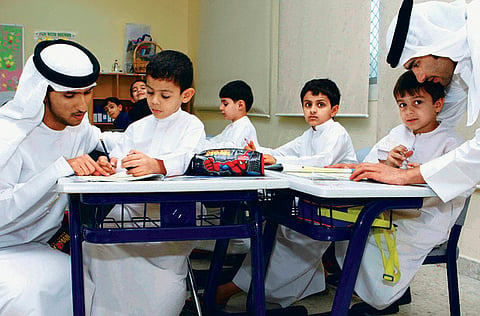A new beginning
There is greater emphasis on reform than ever, as the Abu Dhabi Government's 2030 Plan aims to create a world-class education system

As part of the 2030 plan to place the emirate of Abu Dhabi among the top five governments worldwide, greater emphasis on educational reform has been evident in the past few years.
While recognising that education is the cornerstone of a country's human capital and rapid economic growth — and in line with Abu Dhabi's vision to create a world-class education system that helps prepare individuals to compete with global challenges — the government decided to decentralise the education process across the emirate by establishing an education council.
In September 2005 and in accordance with Law No. 24 enacted by President His Highness Shaikh Khalifa Bin Zayed Al Nahyan, the Abu Dhabi Education Council (ADEC) was established.
Since ADEC's foundation, the organisation has been gradually taking over additional responsibility and authority over schools in the emirate. In January 2010, ADEC and the UAE Ministry of Education (MoE) signed a federal decree, to hand over the school authority in the emirate of Abu Dhabi to ADEC. As part of this move, 13,000 school faculty and administrators were transferred from the education ministry to ADEC. Now ADEC manages private and public schools and universities across Abu Dhabi.
As a result, a ten-year strategic plan to combat challenges and drive improvement in the P-12 public education sector was among ADEC's first cornerstones. The plan helped outline the formation of a New School Model that can help accommodate 150,000 students in Abu Dhabi schools by 2018, support a bi-literate education system and develop independent thinkers with strong problem-solving and analytical skills.
The strategic plan helped highlight loopholes in the current education system, some of which stated that fewer than 10 per cent of tested English teachers in public schools met ADEC's minimum requirements of English proficiency, and Arabic language teacher skills are not on par with ADEC's standards. "Modern best practice teaching standards are not being effectively utilised," the findings stated.
To improve teacher qualifications and as part of the New School Model initiative, 352 principals and vice-principals from 171 public schools in Abu Dhabi have been selected to receive training during the 2010-11 academic year, from the School Leadership Training Academy in partnership with Leeds Global.
Child-centric learning
The initiative is intended to equip academics with the skills and knowledge needed to implement the education model and to encourage a child-centred learning environment with focus on literacy and numeracy skills in Arabic and English, as determined by ADEC.
"The mode of teaching and education in classrooms should change," says Dr Mugheer Khamis Al Khaili, Director General, ADEC. "Teachers should encourage exploration and independent thinking among students. There should be less emphasis on memorisation and more focus on innovation, creativity and team work."
In efforts to drive improvement in English language teaching and introduce modern pedagogic methods in the Abu Dhabi's public school system, ADEC has hired internationally licensed teachers, with a minimum of three years teaching experience and a bachelor degree with high standing.
In 2008, a comprehensive inspection framework, starting with villa schools in Abu Dhabi, was also established. Some villa schools have been proactive in moving to purpose-built facilities on their own accord, however 50 villa schools remain in the emirate.
With the aim of maintaining quality assurance for both academics and students, ADEC inspection teams started to visit private schools. As a result, closure notices for six "active" schools were issued, and another four official closures were given to "inactive" schools in Abu Dhabi; three public school replacements were made available to help accommodate students from the shut-down villa schools; these schools began operation from September 2010.
Emphasis on quality
Seven new school refurbishment projects in Abu Dhabi and one in Al Ain were also introduced during the summer to help set an example to other schools.
The new school campuses meet safety and security requirements, with social, educational and sports activities available for students, families and the wider community. Requirements for students with special needs are also in order, as part of the government's goal of making education accessible to everyone.
In partnership with Oracle, ADEC also rolled out a comprehensive IT infrastructure upgrade programme in more than 300 public schools in Abu Dhabi to help provide access to a total user population of around 500,000.
The user population includes parents, students, teachers and employees, who now enjoy seamless access to the education council's electronic services.
To help provide 75 per cent job placements within six months of graduation, the Abu Dhabi Higher Education Strategic Plan was also introduced by the ADEC. The plan helps outline four key priorities in education, namely raising the quality of higher education comparable to international recognised levels; aligning higher education with Abu Dhabi's social, cultural, and economic needs; building and maintaining a research eco-system to drive an innovation-based economy; and providing all qualified students with affordable access to higher education.
However, recent higher education findings published by ADEC demonstrate concern over the poor performance of Emirati students enrolled in UAE universities. The findings show that in the past 15 years only 3 per cent of public school students were admitted to universities; 30 per cent required strengthening courses and a foundation year to begin their higher education, and 20 per cent struggled and dropped out.
"School buildings, curriculums, teacher qualifications and the assessment system were some of the factors that contributed to this poor performance. We need to carefully align higher education with the labour market and socio-economic needs, guided by the Abu Dhabi Economic Vision 2030 and Abu Dhabi's policy agenda," adds the ADEC Director-General.



